Marta Górnicka
Works
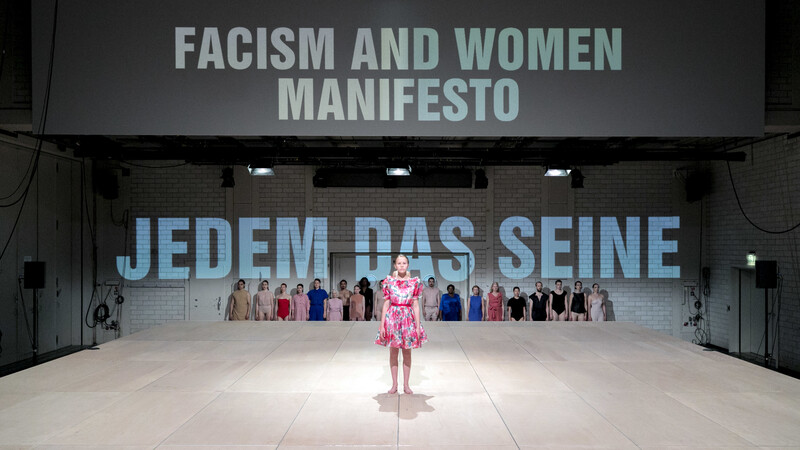
Theaterstück, 2019
»Violence accumulates in bodies and it is impossible to erase. It is still in there,« says a ten-year-old girl in the performance. An older woman adds: »Even the victim cannot believe in what happened to her, because it is so unbelievable that she becomes impossible to herself.«
Nothing demonstrates this better than the history of the exploitation of women through sexual slavery in Nazi Germany, which is still repressed in the collective consciousness. In forced labour camps and concentration camps, sex with prostitutes at camp brothels was the most elaborate form of motivating prisoners to better productivity. This kind of violence was never brought to light, it was never redressed. Women as a cost were forever erased from the collective memory of the Nazi death industry. Has anything changed since the times of Buchenwald?
Fascisms and nationalisms which are resurrected in Europe and all over the world are instrumentalizing the bodies of women and children again, and using them in a political war.
Total supervision over the female body is the foundation of every nationalist populism.
Since the beginning of capital accumulation, the body of a woman was a brutally colonized resource. Women experienced a stronger alienation from their bodies, from their »work«, than what was ever felt by any workers. The cogs of capitalism and nationalism mesh and clench over the female body. In Jedem das Seine, Górnicka looks at the body as a place where fascism keeps regenerating.
With Liliana Barros, Yasin Boynuince, Serena Buchner, Caroline Corves, Leonard Dick, Carmen Engel, Dana Greiner, Marta Górnicka, Maya Haddad, Thekla Hartmann, Antonia Hoffmann, Marion Hollerung, Stacyian Jackson, Gro Swantje Kohlhof, Laura Kupzog, Kim Nguyen, Moritz Ostruschnjak, Gina Penzkofer, Susanne Popp, Melanie Pöschl, Corinna Quaas, Anne Ratte-Polle, Theresa Schlichtherle, Samantha Schote-Ritzinger, Zoë von Weitershausen, Gülbin Ünlü
Photo: David Baltzer
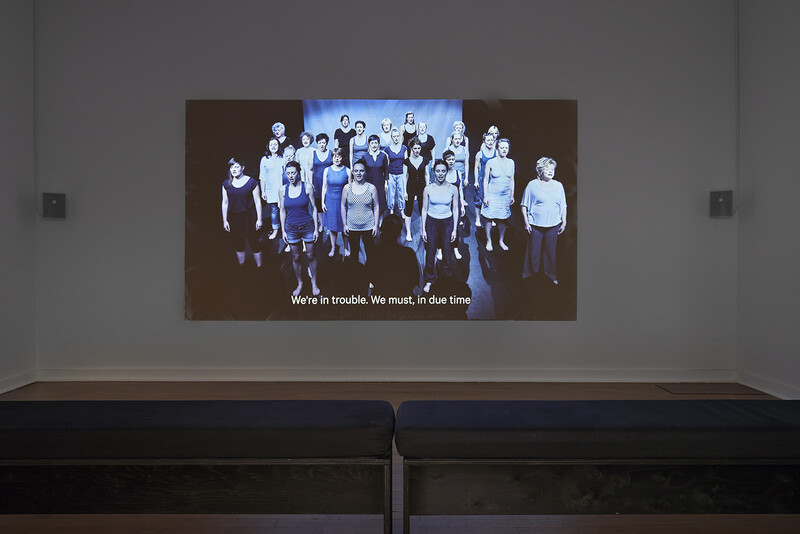
Documentation of a performance, 2019
Magnificat was a show presented by the Chorus Of Women in Warsaw in 2011. The text is a mixture out of quotes from the Bible, food recipes, texts by Jelinek, Mickiewicz, and fragments of Euripides’ Bacchae and a newspaper. The work is a statement about the role of women formed by the church. It confronts us with the most sacred image of femininity within the Church – that of the Blessed Virgin Mary, with its ideological and aesthetic power. Rhythmic speech and pop culture oneliners intertwine with the traditional forms of sacred music and sampled sounds.
Photo: © Egbert Trogemann, VG Bild-Kunst Bonn
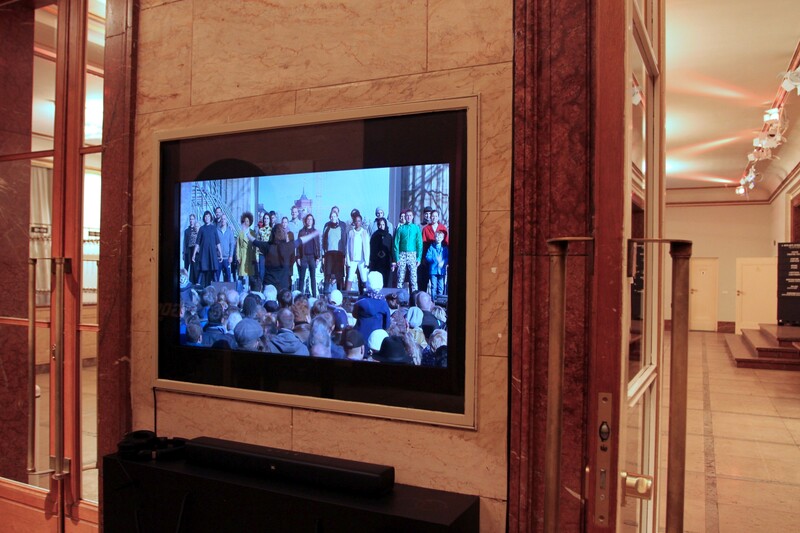
Video, 2018
On October 3rd 2018, Marta Górnicka presented Grundgesetz in front of the Brandenburger Tor as part of the celebrations on the occasion of the Day of German Unity. 50 professional and non-professional actors from different contexts in civil society formed a chorus that questioned the 70-year-old legal text. This performative stress test seeks to demonstrate the limits and current resilience of the words in the constitution within the tensions of society: Who is the subject of the German constitution? In whose name does it speak? Who are »the people«? Who is »the majority«?
Photo: © Lutz Knospe
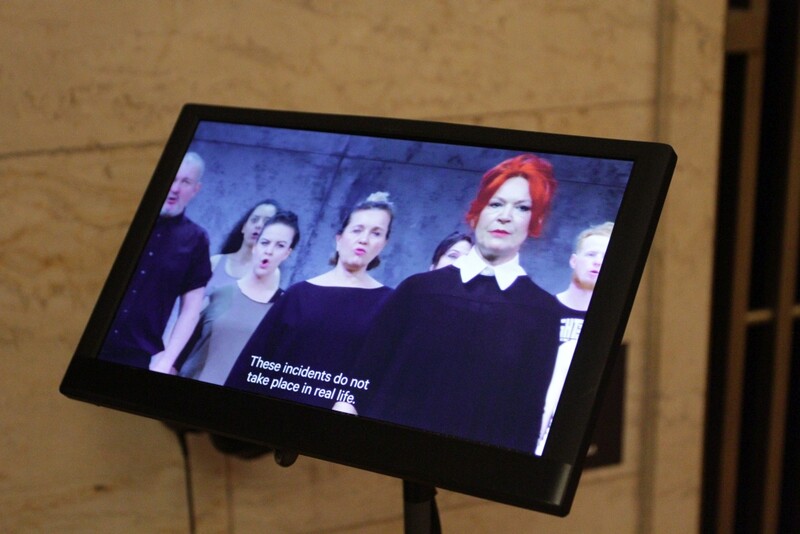
Video, 2017
A piece about Europe that closes the ranks and screams: Give us back our country! In her libretto for Hymn to Love, Marta Górnicka demonstrates the brutal language of today’s politics: She refers to hate speech on the internet, quotes declarations by politicians as well as statements by fundamentalists. She confronts these sentences with pop songs and patriotic songs to unsparingly reveal the misanthropic ideology of nationalism. Górnicka composes a monstrous »National Songbook«, and the chorus exposes the frightfulness of a community bound together by love of country: of a homeland exclusively for people like us. A homeland-family that needs to be protected and kept clean.
Photo: © Lutz Knospe
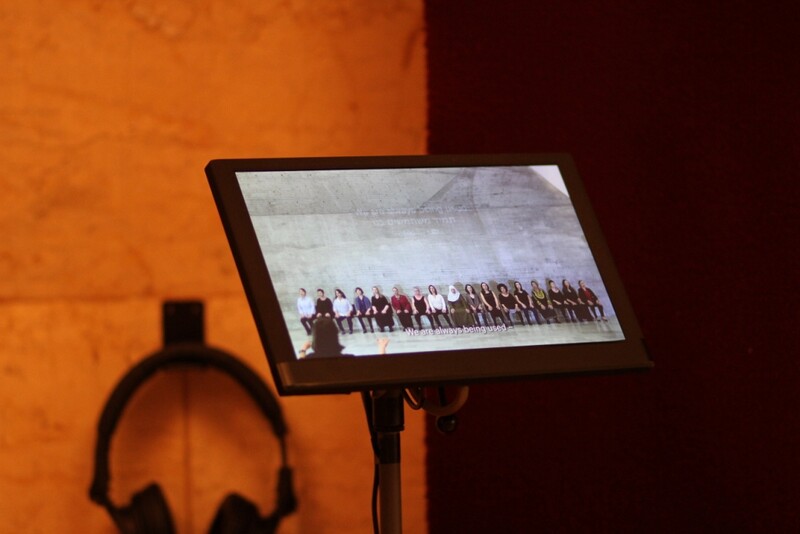
Video, 2014
This piece premiered at the Museum of Modern Art in Tel Aviv in December 2014. Górnicka invited a chorus of 60-members, among them Arab and Jewish mothers, Israeli soldiers, dancers, and Arab children. The groups Górnicka invited to her project are functioning in radically conflicting communities. In the course of their joint work, they create a possibility to express extreme emotions and initiate direct interactions between those who are separated by an invisible barrier. It is no longer about the reproduction of conflicts and mechanisms of its rise on a stage, but also about finding an opportunity to create a joint work that speaks in many languages and at the same time in one human voice.
Photo: © Lutz Knospe
Marta Górnicka founded the Chorus of Women with support of the Warsaw Theatre Institute in 2010. Her productions Magnificat and Requiemachine were shown internationally. At Maxim Gorki Theatre, Górnicka staged Hymne an die Liebe (2017) and Grundgesetz (2018). Jedem das Seine celebrates its Berlin premiere during the 4. Berliner Herbstsalon.
